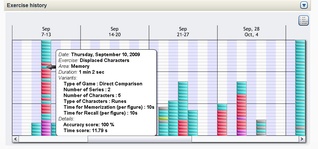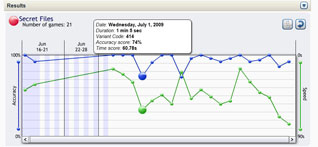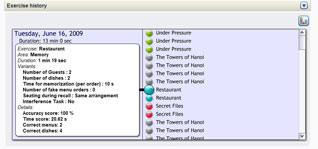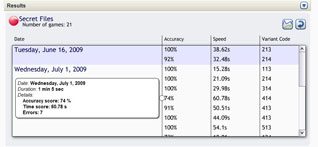The Rehabilitation Program
Testimonials
HAPPYneuron Pro is extremely therapist friendly. You can monitor patient compliance with home exercises.
Richard Dubose MS, CCC-SLP, CBIS, Peace Rehabilitation Center, Greenville Hospital System, University Medical Center, Greenville, South Carolina.
The Rehabilitation Program is an open way of using the HAPPYneuron Pro exercises for treating a wide variety of cognitive impairment conditions, including Traumatic Brain Injury (TBI), Stroke, Learning Disabilities, ADD and more..
This powerful open access enables thousands of unique tasks, allowing professionals to precisely adapt to patient's specific needs. The program is suitable for patients of any age.
- Over
- All exercises delivered through engaging interactive games
- Thousands of unique exercise combinations in each game
How to use it?
Results
Modules
Indications
Clinical studies
Testimonials
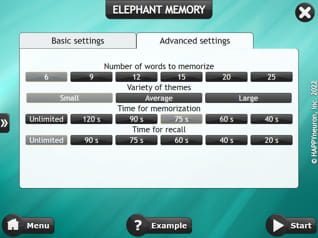
Sample of detailed control panel for selecting game variables
- Clinician can
- Select the exercise variants from a detailed game control panel
- Assign the activites to the patient
- Graphically view the patient activity and progression achievement level for each exercise in the assigned module(s) via tables and longitudinal graphs, etc.
- Work side by side with the patient and/or communicate with the patient with built-in message exchange and notices.
- Patient can
- Select the exercise variants from a detailed game control panel, along with the clinician or therapist
- All variants are available at all times without restriction
- Exchange messages with the therapist if at home.
Once you have selected your patient, you can see his/her results.
(Click to enlarge pictures)
The exercises are grouped in modules to ease the process of building an adapted training plan for your patients.
Executive Functions
This module is specifically designed to train executive functions, including reasoning (capacity to make deductions from hypotheses) and strategy. It contains language-based tasks and visual activities.
Verbal Memory
This module includes perfect exercises to improve verbal memory. It also helps build a strategy (place words into categories for example) to effectively remember a list of words.
Visual Memory
The exercises included in the module will help you to train visual memory using abstract symbols or exotic characters. It also helps pay attention to visual details.
Verbal And Visual Memory
This module contains exercises which train simultaneously verbal and visual memory (menus in a restaurant or cities in a trip).
Spatial Memory
These exercises train abilities to remember locations of items using specific strategies like grouping items or defining patterns.
Visual and Spatial Abilities
This module contains 4 exercises designed to train visual and spatial abilities. It aims at training the patient’s visual mental imagery and more particularly mental rotation in a 3D space.
Visual Attention
This module contains exercises designed to train visual attention. In particular, patients need to pinpoint relevant information, visually scan details and keep mind focused on looking for differences.
Processing Speed
This module includes activities which require answering quickly. In addition, it trains the subject's sustained attention as he has to maintain performance and vigilance over a long period of time.
The table below shows the different patient conditions in which this program is adapted to be used.
| Patient Condition | Notes |
|---|---|
| Traumatic Brain Injury (TBI) | Traumatic Brain Injury impairments and therapies |
| Stroke | |
| Learning Disabilities | |
| Chemo Fog | |
| Speech & Learning Disabilities | |
| Attention Deficit Disorder |
Study
2016-2018: Translational Neuroscience Optimization of GlyT1 Inhibitor
Size
80 subjects
Research Institution
Yale University
Investigator
John H. Krystal, M.D.
Status
In Progress
Study
2016-2017: Exploring cognitive training as a non-pharmaceutical therapeutic intervention for people with Huntington's disease
Size
8 subjects
Research Institution
Cardiff University in the Cardiff Huntington’s Disease Research Centre
Investigator
Emma Yhnell, Pr Anne Rosser
Status
In Progress
Study
2016-2017: Cognitive training program on verbal memory in older women who are within a year of having undergone chemotherapy treatment for early‐stage breast cancer
Size
40 subjects
Research Institution
Rehabilitation Institute of Chicago, Northwestern Feinberg School of Medicine
Investigator
Leora R. Cherney, Diane F. Morean, Alyx Kesselring
Status
In Progress
Study
2016: Evaluation of cognitive tele-rehabilitation program for children with Attention Deficit Hyperactivity Disorder
Size
100 subjects
Research Institution
Bio functional Studies Institute - Universidad Complutense (Madrid)
Investigator
Elimelech Duarte, Jesus Alvarado, Alejandra Koeneke
Status
In Progress
Study
2014-2017: The FOCUS trial: cognitive remediation plus standard treatment versus standard treatment for patients at ultra-high risk for psychosis: study protocol for a randomised controlled trial
Size
126 subjects
Research Institution
Psychiatric Center Copenhagen, Denmark
Investigator
Louise B Glenthøj, Birgitte Fagerlund, Lasse Randers, Carsten R Hjorthøj, Christina Wenneberg, Kristine Krakauer, Astrid Vosgerau, Christian Gluud, Alice Medalia, David L Roberts, Merete Nordentoft.
Status
In Progress
Study
2014-2015: Preparing people marginalized by mental health issues for further education/ employment through Education
Size
25 subjects
Research Institution
George Brown College
Investigator
Jaswant Kaur Bajwa, Alex Irwin
Status
In Progress
Study
2013-2016: Web-based cognitive training for breast cancer survivors
with cognitive complaints—a randomized controlled trial
Size
157 subjects
Research Institution
Unit for Psychooncology and Health Psychology, Department of Oncology, Aarhus University Hospital and Department of Psychology and Behavioural Science, Aarhus University, Denmark
Investigator
MF Damholdt, M Mehlsen, MS O’Toole, RK Andreasen, AD Pedersen, R Zachariae.
Funded by
Research was supported by TrygFonden
Status
Completed
Publication
Study
2013-2015: Scanning Training Rehabilitation for Visual Field Loss after stroke at Home: The STaRFiSH Study
Research Institution
Glasgow Caledonian University
Investigator
Christine Hazelton, Dr. Alex Pollock
Status
In Progress
Study
2012: Conditions for Maximizing Effects of 90 Days of Brain Training
Size
350 subjects
Research Institution
Investigator
Status
Completed
Study
2011: Increased employability of the unemployed aged 50+ through cognitive training?
Size
87 subjects
Research Institution
Investigator
B. Godde, C. M. G. Noack, C. Windisch & C. Voelcker-Rehage
Status
Completed
Study
2009-2011: Intensive Spatial Memory Training for older Adults
Size
40 subjects
Research Institution
Investigator
Status
Completed
Publication
Pending
Study
2008: Cognitive Training Improves Driving Skills
Size
90 subjects
Investigator
Status
Completed
Results
Subjects demonstrate an average of 14% improvement in key skills
Study
2008: Benefits of Online Cognitive Training
Size
217 subjects
Investigator
Bernard Croisile, M.D., Ph.D., Sandrine Bélier, Ph.D., Michel Noir, Ph.D., Franck Tarpin-Bernard, Ph.D., Diana Miner, M.A., M.S., Gaël Allain, Ph.D.
Status
Completed
Results
Subjects demonstrate +8.5% average improvement
Publication
Pending
Study
2007: Online Cognitive Training Improves Cognitive Performance
Size
85 subjects
Investigator
Bernard Croisile, M.D., Ph.D., Sandrine Bélier, Ph.D., Michel Noir, Ph.D., Franck Tarpin-Bernard, Ph.D., Gaël Allain, Ph.D.
Status
Completed
Results
85 HAPPYneuron Users show +16% average improvement in 18 weeks
Study
2006: Memory Stimulation. Which scientific benefits? Which exercises?
Size
39 subjects
Investigator
Status
Completed
Results
HAPPYneuron Users show +12% average improvement in 18 weeks
Publication
Study
2003-2006: The Importance of Memory and Concentration Skills for Schoolchildren
Size
130 subjects school children ages 10 and 11, over a 3 year time frame
Research Institution
City of Elancourt, France ; Association Initiatives Terrain, France ; Lille University, France
Investigator
Neukirch A., Fenouillet F., Hildebrandt R.
Status
Completed
Results
Better CMS score and various effects on recognition tasks.
Publication
Pending
Study
2001-2002: Transferability of Cognitive Training to every-day activities (AKA King 64)
Size
117 subjects children, 10 years old
Research Institution
EMC laboratory (Université Lyon II - CNRS), France
Investigator
Status
Completed
Results
Average of 40%+ improvements in various cognitive skills performance.
Publication


 Previous
Previous